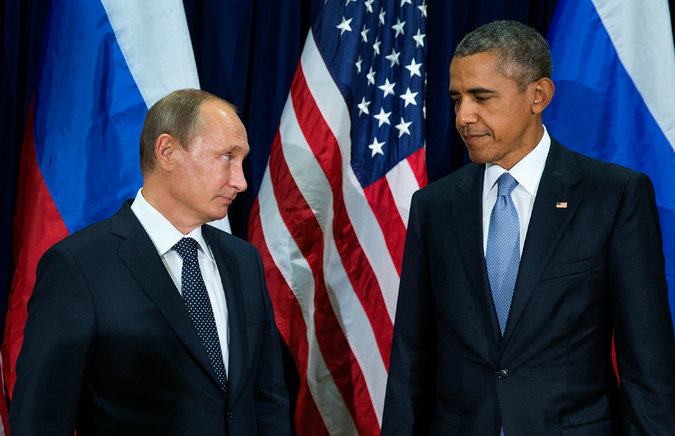
Editorial: President Obama Punishes Russia, at Last
 While it is definitely too late, and may also be too little, there should be no doubt about the correctness of President Obama’s decision to retaliate against Russia for hacking American computers and trying to influence the 2016 presidential election.
While it is definitely too late, and may also be too little, there should be no doubt about the correctness of President Obama’s decision to retaliate against Russia for hacking American computers and trying to influence the 2016 presidential election.
It would have been irresponsible for him to leave office next month and allow President Vladimir Putin to think that he could with impunity try to undermine American democracy. That would have been a particularly dangerous legacy given President-elect Donald Trump’s alarming affinity for Mr. Putin and stubborn refusal to accept the conclusion of American intelligence agencies that Russia’s cyberattacks were aimed at helping him and hurting Hillary Clinton. The president-elect told reporters dismissively before Mr. Obama’s decision was announced that Americans should “get on with our lives” and forget about the hacking scandal. So much for that wishful thought.
Mr. Obama’s action was slow in coming, and until Thursday his only public response, a weak one, had been to “name and shame” the Russians by identifying them as the culprits behind the cyberattacks on the Democratic National Committee and other political organizations and to warn the Kremlin against future interference.
His latest response shows real teeth, chiefly in the form of sanctions on Russia’s two leading intelligence services, the F.S.B. and GRU, including four top officers of the military intelligence unit who the White House believes ordered those attacks. Mr. Obama also placed sanctions against a number of other individuals and companies, such as the Special Technology Center, which conducts signal intelligence.
Mr. Obama also expelled 35 Russian intelligence operatives and barred Russian diplomats from using two recreational compounds in the United States. The White House said this action was specifically in response to a two-year pattern of harassment of American diplomats in Russia by Kremlin security personnel.
Mr. Obama should have retaliated against this treatment a long time ago; still, the expulsion adds to the severity of the American response and directly affects Russian citizens, whereas the travel bans and asset freezes imposed by the sanctions may not. Russian intelligence officials rarely travel to the United States or stash their assets here. Sanctions imposed by the United States and Europe over Russia’s annexation of Crimea and the war in Ukraine have been in place for two years, yet it is debatable how much effect they have had on Mr. Putin. There is thus a legitimate question about whether Mr. Obama’s penalties will be sufficient. Already Moscow is threatening retaliation.
Mr. Obama is in a tricky place. He has been concerned, rightly so, about tailoring a response that imposes costs on Russia and acts as a deterrent to further Russian attacks without escalating a cyberwar. At the same time, he would be wise to explore possible covert actions that would reinforce his public responses to further drive home the point that attacks on American elections, by Russia or any other country, cannot and will not be tolerated. One such action, some have suggested, would be to leak detailed information about Mr. Putin’s vast wealth, which could undermine his credibility with the Russian people.
Mr. Obama’s actions clearly create a problem for Mr. Trump, who has rejected the intelligence agencies’ findings and questioned whether Russia was behind the hacking. In addition to announcing the sanctions, the administration released further evidence of Russia’s interference, including a report by the F.B.I. and the Department of Homeland Security that contained samples of malware and other indicators of Russian cyberactivity. Many more details could well surface if Congress, as many have urged, names a special bipartisan investigative commission.
Once the sanctions were imposed, Mr. Trump repeated his call for the country to “move on.” But after flaunting his refusal to take regular intelligence briefings, he also said he would meet next week with leaders of the intelligence community for an update on the hacking. Leading members of his Republican Party in Congress have already drawn their conclusions: The House speaker, Paul Ryan, called the sanctions appropriate, while Senator John McCain and Senator Lindsey Graham promised to lead an effort to impose even tougher penalties. In less than a month, Mr. Trump will have to decide if he stands with his democratic allies on Capitol Hill or his authoritarian friend in the Kremlin.
